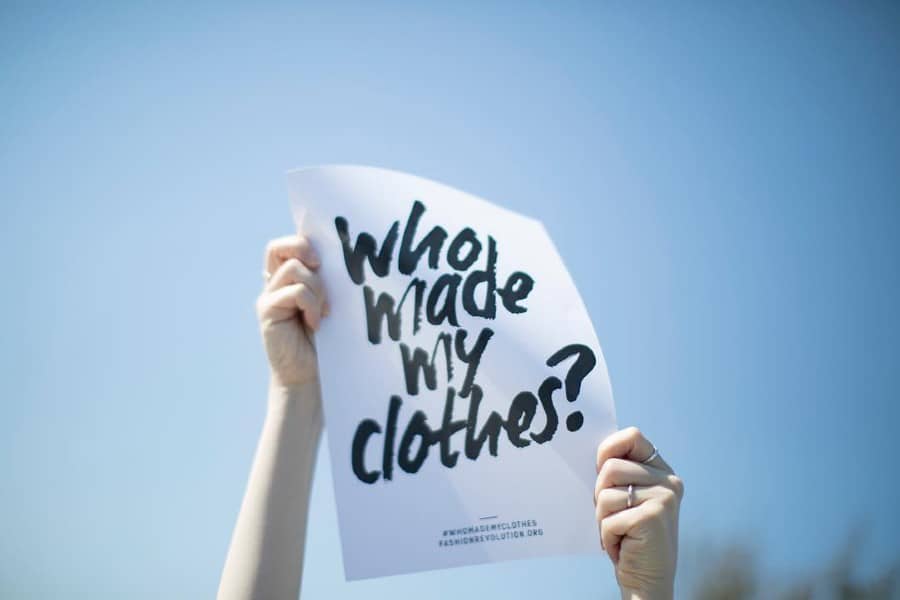
#WhoMadeMyClothes? #LovedClothesLast
Starting today, on the 20th April and running through until the 26th, Fashion Revolution Week 2020 is the annual global movement fighting for a fairer, safer and more transparent fashion industry. This year marks one of the most pivotal yet, a call to action and awareness during the global pandemic times of COVID-19. We at RUSSH are passionate about the fashion industry and advocates for safe production and ethical treatment. This is an initiative that is really important to us and here's why it should be important to you too.
What is Fashion Revolution?
Fashion Revolution is the world’s largest fashion activism movement. The movement was founded 7 years ago when an immediate call to action was needed after the horrific collapse of the Rana Plaza factory in Bangladesh on the 24th April 2013. Now with voluntary teams in 90 countries, Fashion Revolution campaigns for a clean, safe, fair, transparent and accountable fashion industry through the work of research, education, collaboration and advocacy for change.
The campaign this year will focus on four key pillars:
- Consumption – our habits.
- Composition – how our clothing breaks down and what fabrics we should be investing in.
- Conditions – of where and which our clothing is made in.
- Collective Action – required from us as consumers, our industry and governments.
Why it matters…
This year in 2020 marks a particularly different Fashion Revolution Week. As we navigate the ever evolving COVID-19 pandemic, the industry has been put under the microscope with brands needing to take responsibility for the welfare of garment workers in their supply chains. Sick pay, paid leave along with adequate health care have all been compromised due to the increasing economic effects of the pandemic. As this week also marks Earth Day, we need to ensure we rebuild a fashion industry that conserves and restores the environment while also most importantly one that values people over profit.
Facts to get you thinking…
- More than 1 million garment workers in Bangladesh have already lost their jobs or have been furloughed because of order cancellations and the failure of buyers to pay for cancelled shipments related to COVID-19 (Centre for Global Worker’s Rights, 2020).
- Over 90% of workers in the global garment industry have no possibility to negotiate their wages or conditions (IndustriALL).
- Buying one new white cotton shirt produces the same emissions as driving a car 35 miles (Oxfam, 2019).
- Garments are the 2nd highest at risk product category for modern slavery (Walk Free Foundation, 2018)
- If the number of times a garment is worn was doubled, the greenhouse gas emissions over its lifetime would be 44% lower (Ellen MacArthur Foundation, 2017).
- Producing plastic-based textiles uses approximately 342 million barrels of oil each year (Ellen MacArthur Foundation, 2017).
#WhoMadeMyClothes?
The trending hashtag for this year is #WhoMadeMyClothes? A call to action for fashion brands to protect the workers in their supply chains and a demand for greater transparency in the industry. This is a time to ask your favourite brands and designers #WhoMadeMyClohtes? and inspire them to join the meaningful conversation and share their workers and makers stories with #IMadeYourClothes. In addition to this, the hashtag #WhatsInMyClothes? will also be a focus to shine a light on the nasty hidden substances in our clothing and a brands commitment to eliminating virgin plastics and preventing microplastic pollution to protect our earth and oceans. This is a time to investigate your wardrobe and understand what fibres you own and wear. Lastly, the hashtag #LovedClothesLast is an opportunity to share a clothing love story and start a conversation on how to care and mend garments in order to keep them in circulation and out of landfill for more sustainable personal consumption.
Local brands supporting this year’s Fashion Revolution campaign include David Jones, Kit X, St. Agni, Ethical Clothing Australia, THE ICONIC, Spell & The Gypsy Collective, Mighty Good Basics and more.
Now is the time more than ever for us as consumers to hold brands and retailers accountable to create safer work places and a more sustainable fashion industry - especially in the lead up to Earth Day 2020. Be sure to get involved and join the conversation.



